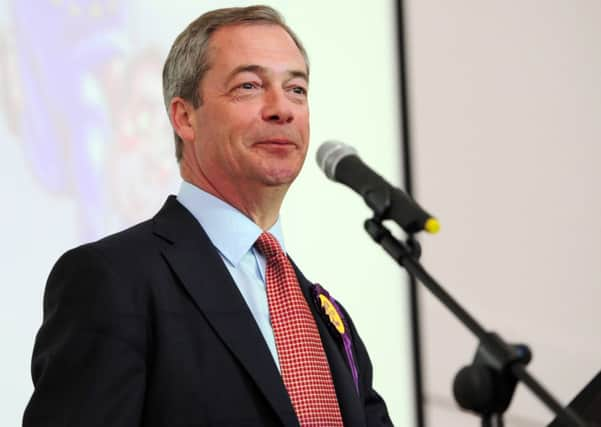UKIP leader Nigel Farage backs County Times Free Speech Charter


UKIP supporters from across West Sussex joined him in his support - promising to sign the Charter en masse.
Mr Farage said: “I fully support this campaign to make local elections more transparent and accountable to the voters.
Advertisement
Hide AdAdvertisement
Hide Ad“Local election turn out is often cited as being low and perhaps one reason behind this is that too often councillors and council officials are making big decisions behind closed doors shutting out local residents from the decision process.


“This is not only an affront to open and transparent democracy but often costs taxpayers money when the decision is finally exposed to the public.”
His words were echoed by Michael Glennon (pictured), UKIP opposition leader on West Sussex County Council.
He said: “On behalf of the West Sussex County Council UKIP Opposition Group, I offer full support to your initiative.”
Advertisement
Hide AdAdvertisement
Hide AdThe County Times has written to all 44 district councillors along with the leaders of the political groups at West Sussex County Council inviting them to sign up to a simple statement of intent.
It says: “I undertake to speak, write and vote on behalf of my constituents without fear or favour of party discipline. If I am a member of a political party, I will respect its values and honour its pre-election manifesto pledges - but I will always put first the people I am elected to serve.”
Future candidates of any political party and none are also invited to indicate their support.
Head of News Mark Dunford said: “It is our hope that out of this story we can achieve something that will really help the electorate re-engage with local politics; and the issue of free speech could not be more timely in the year we commemorate the sacrifice of millions of young men in the First World War. Next year, is the 800th anniversary of the Magna Carta, the cornerstone of modern freedom.”
Advertisement
Hide AdAdvertisement
Hide AdPolitical editor Joshua Powling added: “The Free Speech Charter is designed to encourage more open debate in council meetings and eliminate the whipping of votes.
“We believe it will help rebuild the public’s trust in local politics as well as engaging more people in the democratic process at council level.
“I know from my own experience of covering council meetings, how dismayed many members of the public are by the predetermined nature of many key debates.
“Planning committees are a notable exception. It would be excellent if all business was transacted with the same spontaneity.
Advertisement
Hide AdAdvertisement
Hide Ad“Turnout at elections has been falling steadily over many years, especially among a younger generation. There is a real sense that much of the ‘cut and thrust’ of political debate has been lost by the single party cabinet system exacerbated by closed private meetings of political groupings where whipped votes have become sadly too familiar on matters of legitimate public interest and concern.”
The Charter was instigated following a whipped vote to deselect Tory vice chairman Mr Mitchell, who said he had been punished for speaking out on behalf of his constituents over plans for massive housing in North Horsham.
Since then, Mr Mitchell has written in this newspaper to describe the secret meetings of his Conservative Group where key decisions are taken in private, and a ‘secret court’ he faced last autumn for raising matters which he believed were in the public interest.
Mr Glennon added: “Government at all levels is increasingly despotic and is undermining democracy.
Advertisement
Hide AdAdvertisement
Hide Ad“Elected representatives are gleeful when they see their votes building up into nice little piles at the election count. Then comes the ecstasy moment when they are declared winner of this ward or that division and a four year term awaits them and voters can be forgotten. Time now to listen to party whips, not residents! True? Well, depends who you ask.”
Councillor Glennon continued: “The obligation for elected representatives to put residents’ interests first should be sacrosanct. Central to our philosophy at county hall as the main opposition group is that our UKIP councillors are not ‘whipped’ by party diktats – they are free to argue the case for their own community members – regardless of party policy.
“In the USA freedom of speech is enshrined as a constitutional right under the First Amendment, but is such freedom alive and kicking in Britain – and specifically in the halls of
power? That is the question on the lips of many around Horsham of late with the sacking of the district chairman-elect for speaking out for residents against the orthodoxy of the ruling party. How dare he protest about Horsham district disappearing under concrete?
Advertisement
Hide AdAdvertisement
Hide Ad“UKIP councillors are well aware of our party manifesto – after all they campaigned on that ticket and we have faith in what we are doing.
“However, on rare occasions a particular policy may be at odds with what a local community group wants and this is when the essential acid test of democracy chips in. Who do you listen to – party or people?
“Let’s take a hypothetical example: my own residents in Lancing conclude en masse one day that the EU is the best thing to happen to Britain since 1066. Suddenly, it’s sexy to pay £55m daily to have our laws dictated to us by foreign bureaucrats and our front door removed for all and sundry to enter the country to enjoy British jobs and benefits. What do I do? Well, I simply have to argue their case! My own personal stance is important to me, but I am here to represent the electorate. If I can’t do that I have to move over and let the people find someone who will represent their views. Happily, my friends and neighbours in Lancing are unlikely to put me to that particular test, but it makes the point. When a ruling party sacks a prominent member for fighting the community corner, it’s time to think very seriously about democracy itself!”